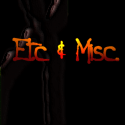|
|
|
Vampire
Guide 502: What is the Cause of Vampirism?
A look at
several of the common theories on the net
Unfortunately, no one knows the reason, or "cause" of vampirism. It's all just
speculation and personal theory. It generally falls into the following
categories (which I've attempted to give a brief overview of
with the factors going for and against the theory):
-
Genetic
This theory says that a vampire is a vampire because there is a
vampiric "gene" which makes a person biologically
different from people without this/these gene(s). Were this true,
it would probably be very recessive so it can "lurk" in family lines and show up out of the blue
(like red hair in a family with all brunettes), but also why it can seem to always show up in lines as
well (coming from a vampiric grandmother, father, and having a
vampiric child for example).
Pros:
Explains the commonly reported physiological differences, sensitivities,
and physical reactions that many vampires have. (see
Vampire Guide 301)
Could also account for
differences in ability to digest blood.
Cons: At this time, it's completely improvable. Additionally,
pending on the radical nature of such differences, the question of
being a sub-species comes into play. There can not be too much
difference or else people of this "sub-species" would be
unable to breed with "normal" humans and this is known
to be possible.
-
Spiritual/Soul
This theory says the vampiric person possesses a non-human soul; a soul which is contained within a human body, but is vampiric in origin.
Similar in thoughts to that of most types of "otherkin."
Most who follow this theory, do in fact term themselves a type of
otherkin. (see What
are Otherkin? and the sister site, Embracing
Mystery for more on otherkin specifically) Generally,
the nature of the vampiric soul is seen to stay dormant until the
body is done with it's "normal" developments, at which
point, a secondary wave of changes occur, bringing on the
Awakening to their "true," inner nature.
Pros: Some
use a secondary genetic backing for this theory, speculating that the soul/spirit does in fact modify the genetic code in some
(unknown/unexplained) ways to better force the human body to accommodate
the vampiric needs such as digestion of blood, better predatory senses,
etc. This would also account for the specific common physiology
and sensitivities. (see Vampire
Guide 301)
Cons:
Certainly improvable now and for the foreseeable future. Does not
specifically address the tendency for some vampires to come from
family with vampiric lines (though some speculate that vampiric
souls would be drawn to suitable bodies and therefore, stay
oftentimes in families which have appropriate genetic
lines).
-
Parasitic/Symbiotic
Entity This theory states that the vampiric person is
actually a host to a completely separate entity. The person is
fully human in soul/spirit and genetics, but there is a secondary
life form within the host body (either parasitic or symbiotic
depending on point of view). Many people who uphold this theory do
in fact believe the condition to be "curable" by the
removal of the entity, though some believe it to be fatal to the
host (as they are now linked). Those who offer this
"cure" usually expect a high price for their services.
Pros: This separate
entity would cause drastic changes to hosts body and brings on pluses and
minuses such as increased healing for the host, but a need to ingest
blood. Would either override the genetic theory by saying the DNA
of the entity would be enough to alter the host body and/or the
entity would be able to alter directly the host's DNA to bring on
vampiric characteristics. (see
Vampire Guide 301)
Cons: No
explanation for how this entity would come to be in a person in
the first place; no reasoning for the age of "awakening"
to be similarly found at late teens/early twenties, no reason for
it showing up in family lines.
-
Damaged/Missing
Charkas; Energy Deficiencies; etc. This theory states a
vampiric person is born with a "metaphysical" disorder which requires
supplemental sources such as blood. This again is commonly seen as
"cure-able" or "fixable" pending on the
specifics of the theory (some see a missing charka, while others
simply see it as blocked or damaged which can be repaired).
Pros: Better
explains the needs of psychic vampires and the constant need to
pull ambient energies. Can be seen as a genetic damage which would
run in family lines but might not always show up.
Cons: Doesn't truly explain any
commonly seen vampiric characteristics (see
Vampire Guide 301)
; doesn't explain need
for blood ingestion; doesn't explain remaining dormant until late
teens/early 20's; doesn't really explain link within family lines;
doesn't offer much in the way of cause of initial contraction of
blockage/damage.
-
Virus or other outside pathogen
This theory states there is a virus or other similar biological explanation
for a vampire-like disease/condition
which is contracted (somehow) and which either alters the physiology
of the person, or causes cascading changes in some unknown ways
("retrovirus" is a common term seen in connection with
this theory).
Pros: Might
explain showing up in "out of the blue" in families for
which there are no other vampiric people; might support the
vampiric genetic theory in that the virus would cause changes
leading to common vampiric characteristics (see
Vampire Guide 301)
.
Cons: This would make it seem transferable or
"catch-able" when it's not; doesn't explain for people getting "exposed" to it who know no other vampiric people; states basically that this virus is either manufactured
{there are many sites out there with references to "V5" but this is FICTION and was created as hype for a
British TV SHOW}, or is some sort of retrovirus which causes cascade changes to the infected person's
DNA. It's been used by a TV show for marketing, and has
additionally been used frequently as a "conspiracy
theory" of government wrong-doing leaving very little actual credence.
Most of these theories are only that - guesses. Many of these theories don't really stand up to critical thinking and process. Several of these theories are populated and their appeal is increased by various books/movies/other fictional usage of similar
explanations.
The short answer is there is no "right" answer at the moment. To each their own truth. There may not even be a single "cause" for vampirism and there might be
varying "types" of it which all look outwardly similar, but are caused by different reasons. Until and unless people with these collective traits who take on the term "vampire" or "vampiric" or "sanguinarian" allow themselves to be seriously studied in controlled, scientific groups, there's not going to be a
definitive answer.
Read any site you want and research other's opinions, however, take it all with a grain of salt and make your own thoughts and theories.
|







